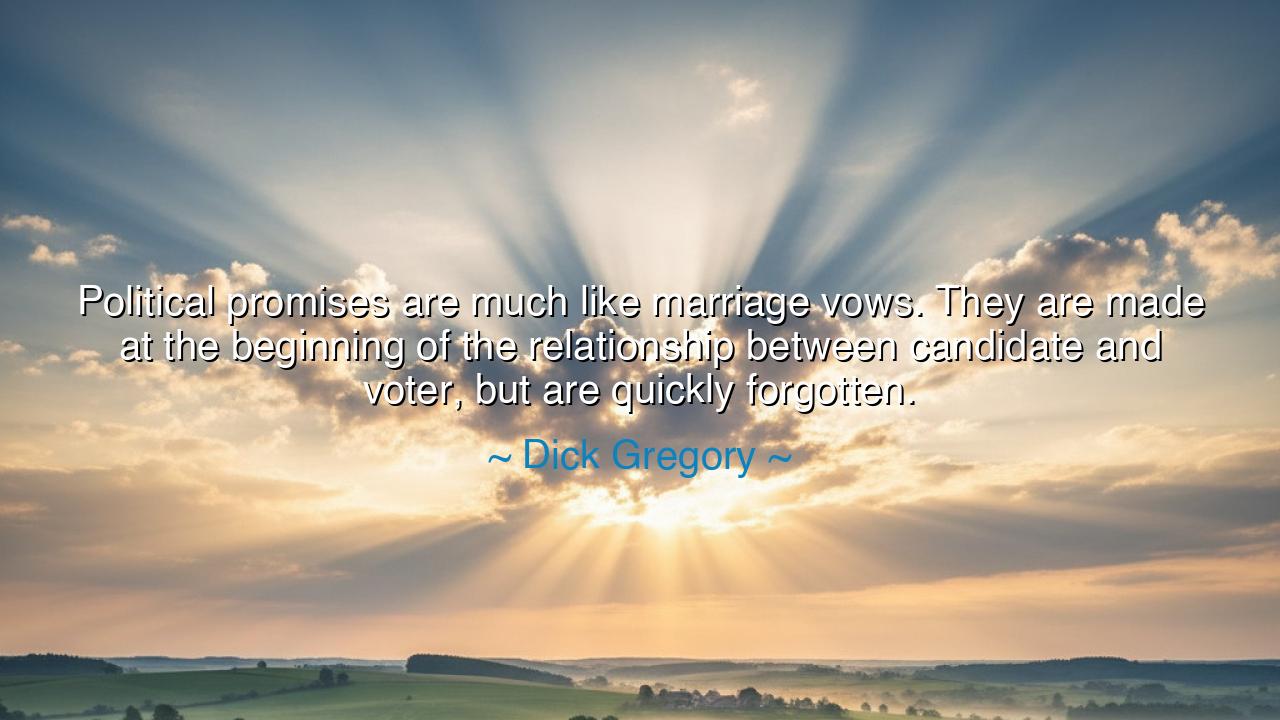
Political promises are much like marriage vows. They are made at
Political promises are much like marriage vows. They are made at the beginning of the relationship between candidate and voter, but are quickly forgotten.






In the piercing words of Dick Gregory, comedian, activist, and truth-teller, we hear a lament that transcends humor and cuts to the heart of human nature: “Political promises are much like marriage vows. They are made at the beginning of the relationship between candidate and voter, but are quickly forgotten.” Though wrapped in wit, this saying bears the weight of centuries of disillusionment—a truth known to every generation that has placed its hope in the words of leaders. Gregory, who wielded comedy as a sword against hypocrisy, exposes the fragile bond between politician and people, a bond built on trust yet too often corroded by ambition and neglect.
To understand the meaning of this quote, one must first see the parallel that Gregory draws between politics and marriage—two unions founded upon vows, upon promises of fidelity and shared purpose. In marriage, the vow is to love, to honor, to protect; in politics, it is to serve, to uplift, to represent. But just as passion in marriage can fade into complacency, so too can political zeal dissolve into self-interest once the election is won. The candidate, once humble and attentive, becomes the ruler; the voter, once courted and cherished, becomes forgotten. Gregory’s words remind us that power, like affection, must be renewed through action, or else it turns hollow and false.
The origin of such insight is rooted in the long and bitter history of democracy itself. From the republics of ancient Greece to the parliaments of the modern world, the story remains the same: the governed give their trust to the few who promise to serve the many. Yet when those promises are broken, the fabric of faith tears. In the city of Athens, the great orators once vowed to guard the people’s freedom, but when corruption crept in, democracy itself faltered. Likewise, in the Roman Republic, leaders swore to defend the Senate and the citizenry—but their ambition birthed empire and tyranny. Across the ages, Gregory’s truth has played out like an eternal cycle: the vow made in light, the betrayal born in shadow.
There is also a deeper irony in Gregory’s comparison. He knew that both love and politics demand constant vigilance. A marriage cannot survive on words alone; it must be nourished by daily acts of care and remembrance. In the same way, democracy cannot endure through speeches and slogans, but through continual accountability. When leaders forget their vows, it is not only their honor that decays—it is the hope of those who believed in them. Gregory’s humor, sharp as lightning, was not meant to mock faith, but to awaken it. He sought to remind the people that laughter could be a weapon against lies, that truth could still be spoken in jest.
Consider the story of Abraham Lincoln, a man who understood both the power and peril of promises. In the furnace of civil war, he pledged to preserve the Union and to free the enslaved. His words were not empty vows, but oaths sealed by sacrifice. Unlike the politician who forgets his pledges once elected, Lincoln carried his promise as a burden until death. His example stands as proof that the vow between leader and people can still be sacred when joined to conscience. Yet history also remembers countless others—kings, presidents, and ministers—whose broken promises led not to unity but to ruin. Thus, Gregory’s wisdom echoes like prophecy: beware the sweet words of power, for they often sour in the mouth of time.
The lesson hidden within this quote is not merely about politics; it is about the human heart. Promises are easy in moments of desire and ambition, but difficult in the long journey that follows. Whether in marriage or in governance, the test of character lies not in the making of vows, but in the keeping of them. Citizens, too, bear responsibility—for when they forget to hold their leaders accountable, they become complicit in their own betrayal. As in marriage, silence in the face of neglect only deepens the distance. A democracy, like love, thrives on honesty, dialogue, and mutual respect.
Therefore, let this wisdom of Dick Gregory be passed down as both warning and commandment. Do not be swayed by the music of promises, but look to the deeds that follow. Judge your leaders not by their words in the season of courtship, but by their faithfulness in the season of power. And above all, remember that every promise, whether made at an altar or a podium, is a sacred trust between souls. If we would live in a world where truth endures, we must demand of our rulers—and of ourselves—the courage to keep our vows. For it is not promises that sustain the world, but integrity, renewed daily, through action and remembrance.






AAdministratorAdministrator
Welcome, honored guests. Please leave a comment, we will respond soon